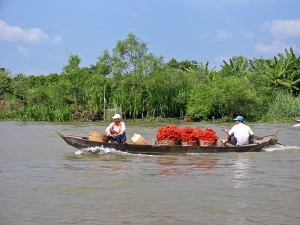Vietnam’s Drought: Climate Change in the Mekong Delta
 At a seminar held in Can Tho City on Wednesday, February 17, Deputy Prime Minister of Vietnam, Mr. Nguyen Xuan Phuc, declared the urgent need for national provinces located within the regional Mekong Delta to address the effects of climate change. The announcement underscored the fact that the delta region was suffering from its worst drought in 90 years.
At a seminar held in Can Tho City on Wednesday, February 17, Deputy Prime Minister of Vietnam, Mr. Nguyen Xuan Phuc, declared the urgent need for national provinces located within the regional Mekong Delta to address the effects of climate change. The announcement underscored the fact that the delta region was suffering from its worst drought in 90 years.
Minister of Agricultural and Rural Development, Mr. Cao Duc Phat, stated that the drought was the result of a shortened rainy season caused by El Niño, a climate phenomenon that recurs every two to seven years. A fall in annual rainfall levels of 20 to 40 percent has been predicted and water flow in central-northern and central-southern rivers is expected to drop by 50 to 80 percent. As a result, residents of the Mekong Delta have been experiencing fresh water shortages and the intrusion of saltwater into rivers.
The implications of such climate patterns have been severe for the agricultural sectors of the affected Vietnamese provinces. Roughly 104,000 of the 340,000 hectares of rice crops vulnerable to saltwater intrusion across the eight coastal provinces located within the Mekong delta have suffered in quality as a result of saltwater intrusion. Faced with grave climate forecasts, provincial authorities have implemented several projects in order to mitigate climate effects on a short-term basis. Such efforts include the reform of crop-cultivation schedules and the construction of temporary dams and culverts.
The Ministry of Agriculture and Rural Development has also advocated several measures — including the digging of wells and the dredging of canals — to address the freshwater shortage by improving water storage capabilities. Additionally, some provinces have invested in the construction of river embankments and dykes.
However, the financial costs of long-term efforts to address the effects of climate change on the delta are likely to be much higher; Minister Phat has provided a rough estimate of four billion dollars to mitigate the impact of the drought and saltwater encroachment. According to Deputy Prime Minister Phuc, long-term measures may include innovative irrigation techniques, initiatives to secure fresh water, the reorganization of agricultural areas, the development of crops compatible with high levels of salt, the strengthening of disaster management systems, and interministerial research on further efforts.
As Prime Minister Nguyen Tan Dung declared at the 21st Conference of the Parties to the United Nations Framework Convention on Climate Change (COP 21) last December, the implementation of long-term measures will likely require substantial financial support from the international community—a reality that calls into question the sustainability of climate change adaptation efforts within the country.
